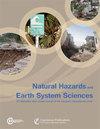Climatological occurrences of hail and tornadoes associated with mesoscale convective systems in the United States
IF 4.7
2区 地球科学
Q1 GEOSCIENCES, MULTIDISCIPLINARY
引用次数: 0
Abstract
Abstract. Hail and tornadoes are hazardous weather events responsible for significant property damage and economic loss worldwide. The most devastating occurrences of hail and tornadoes are commonly produced by supercells in the United States. However, these supercells may also grow upscale into mesoscale convective systems (MCSs) or be embedded within them. The relationship between hail and tornado occurrences with MCSs in the long-term climatology has not been thoroughly examined. In this study, radar features associated with MCSs are extracted from a 14-year MCS tracking database across the contiguous United States, and hazard reports are mapped to these MCS features. We investigate the characteristics of hail and tornadoes in relation to MCSs, considering seasonal and regional variabilities. On average, 8 %–17 % of hail events and 17 %–32 % of tornado events are associated with MCSs, depending on the criteria used to define MCSs. The highest total and MCS-associated hazard events occur from March to May, while the highest MCS-associated portion (23 % for hail and 45 % for tornadoes) is observed in winter (December–February) due to the dominance of MCSs caused by strong synoptic forcing. As hailstone size increases, the fraction associated with MCS decreases, but there is an increasing trend for tornado severity from EF0 to EF3 (Enhanced Fujita Scale). Violent tornadoes at EF4 and EF5 associated with MCSs were also observed, which are generated by supercells embedded within MCSs.美国与中尺度对流系统有关的冰雹和龙卷风气候现象
摘要冰雹和龙卷风是危险的天气事件,在全球范围内造成重大财产损失和经济损失。在美国,最具破坏性的冰雹和龙卷风通常是由超级气团产生的。不过,这些超级气团也可能向中尺度对流系统(MCS)的上层发展,或嵌入其中。在长期气候学中,冰雹和龙卷风的发生与中尺度对流系统之间的关系尚未得到深入研究。在这项研究中,我们从美国毗连地区 14 年的 MCS 跟踪数据库中提取了与 MCS 相关的雷达特征,并将灾害报告映射到这些 MCS 特征上。考虑到季节性和区域性变化,我们研究了冰雹和龙卷风与 MCS 相关的特征。平均而言,8%-17% 的冰雹事件和 17%-32% 的龙卷风事件与多气候系统有关,具体取决于定义多气候系统的标准。3 月至 5 月发生的危害事件总数和与多边监控系统相关的危害事件数最多,而与多边监控系统相关的危害事件数最多的部分(冰雹为 23%,龙卷风为 45%)则出现在冬季(12 月至 2 月),原因是强对流强迫导致的多边监控系统占主导地位。随着冰雹粒径的增大,与多导气候系统有关的部分有所减少,但龙卷风的严重程度从 EF0 到 EF3(增强藤田风级)呈上升趋势。此外,还观测到了与多级龙卷风相关的 EF4 和 EF5 级猛烈龙卷风,这些龙卷风是由嵌入多级龙卷风中的超级气团产生的。
本文章由计算机程序翻译,如有差异,请以英文原文为准。
求助全文
约1分钟内获得全文
求助全文
来源期刊
CiteScore
7.60
自引率
6.50%
发文量
192
审稿时长
3.8 months
期刊介绍:
Natural Hazards and Earth System Sciences (NHESS) is an interdisciplinary and international journal dedicated to the public discussion and open-access publication of high-quality studies and original research on natural hazards and their consequences. Embracing a holistic Earth system science approach, NHESS serves a wide and diverse community of research scientists, practitioners, and decision makers concerned with detection of natural hazards, monitoring and modelling, vulnerability and risk assessment, and the design and implementation of mitigation and adaptation strategies, including economical, societal, and educational aspects.

 求助内容:
求助内容: 应助结果提醒方式:
应助结果提醒方式:


